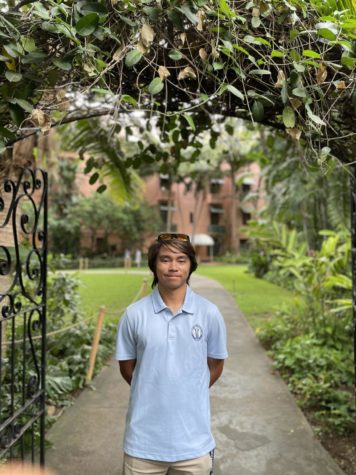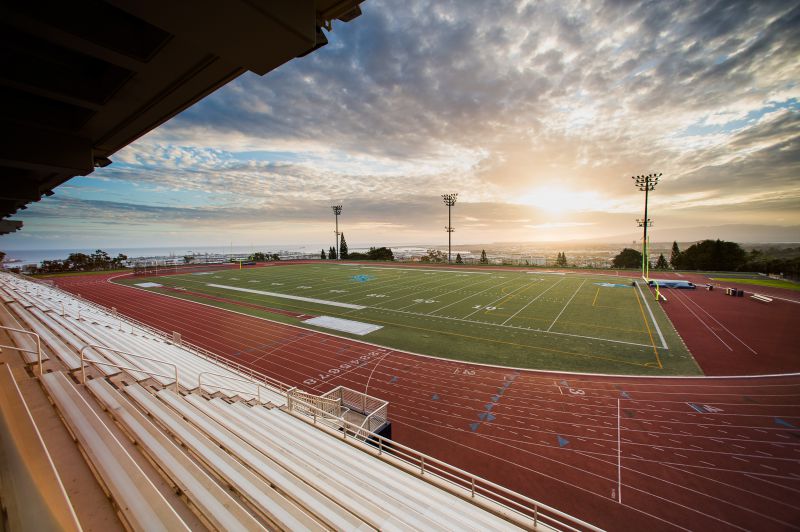PE or No PE?
High schoolers participate in frequent running-checkpoints at the KS track.
For many years, the Kamehameha Schools Physical Education program has held a reputation for being one of the most rigorous programs around. And rightfully so; seven semesters of PE in one high school career is much more than the typical curriculum. However, this may soon change.
It has been reported that the current PE curriculum will be retired in favor of a shorter, less taxing one that requires only one semester of actual physical education, like the public school system in the state of Hawaiʻi. No more Junior and Senior events, no more Sophomore sports. Just one unit of PE for KSK students in the new program. This change has already seen a lot of criticism from current students who are enrolled in the current program, as well as alumni who completed the program themselves. Most of the opposition comes from one main argument; why should others get the easy way out?
I, for one, would have to agree. The goal behind the rigorous PE program has been to promote a healthy lifestyle for Hawaiians–one that is unique from the rest. At KS, students are trained to be their fittest selves–and the curriculum doesn’t stop there either. Students are also taught about wellness throughout their lives. Whether it be their relationships with others, their responsibilities in the classroom, or their participation in other extracurriculars, the PE program covers it all. Now, much of that will be abandoned. All in favor of a much shorter program that will only take up a fraction of a student’s high school tenure.
In the new program, KS high school students will be required to take a semester of “PE fundamentals” and a semester of Personal Health, a course that is already required of KS students. The “trade-off” would be a plethora of elective PE classes that will be offered to students. We already see this in the form of the scuba and lifeguard classes that are offered in place of Junior and Senior PE. The problem resides in the presumption that students who may need extra help with their physical well-being will not be the ones taking these classes.
“A student who enjoys surfing will take a surfing class. However, a student who would rather spend their time with academics or performing arts will take those classes instead,” said PE Kumu Alika Chee. And he’s right; if students who don’t necessarily like PE get to choose whether to do athletic-based classes or not, they will likely opt out of the classes entirely. Not to mention, the elective classes will not be able to promote aerobic fitness in the same way that the current PE program does.
The new courses will be specialized classes to teach their respective subjects. Kumu Chee brought up a quote from science fiction author Robert Heinlein which says: “Specialization is for insects.” An individual who is proficient in physical health does not focus on one activity. They are well-balanced people who know that the more specific their activities become, the less beneficial it tends to be for their overall physical health.
Even with these changes, the PE department is committed to providing KS students with the best possible program that is possible. They will work to bring physical education to as many students as they can in their high school career no matter what. Whether the program is implemented or not, the PE kumu and the entirety of the department will work hard to ensure that health and physical wellness is a staple of this school’s education.
All in all, the promotion of health on campus will still be present, but not pushed the same way it was before. As a Native Hawaiian who is well informed of the health problems that many other Hawaiians suffer, I believe that it is imperative to our people that we continue to be on top of our health and wellness. If not KS, then who will take on the responsibility of educating young Hawaiians on the importance of their health and well-being?

EMAIL: [email protected]
Aloha! My name is Kanoa and I am a senior at KS. This is my first year as a member of Ka Mōʻī, where I will be able to channel my passion for writing and storytelling. To make my last year on this campus unique, I decided to step out of my comfort zone and commit to something bigger than myself. By joining Ka Mōʻī, I hope to achieve this goal while also doing something I enjoy. Outside of school, you can probably find me down at the Royal Hawaiian Shopping Center, working as a soundman for the performers on stage. If I'm not working or learning, I'm almost certainly hanging out with friends or spending time with family. During my time in Ka Mōʻī, I will commit to writing with dependability and accuracy, no matter the case.



Courtney Mann • Jan 10, 2023 at 9:17 am
I see both perspectives. We have always had a rigorous Physical Education program here at KS, and it is dawning that the program is soon shortening. I fall under the category of the student who has been part of the program all four years of high school and is upset that it is only changing now. However, I believe that though the PE program is becoming more lenient, I do feel as though we should continue the program in different ways, health-wise. For instance, instead of just running or swimming, we have alternatives, like how Kumu Chee said. I am not the best runner or swimmer, but I do love to play volleyball in my spare time, or bike when I get the chance.
Terina Garcia • Jan 10, 2023 at 9:15 am
Aloha Kanoa,
I definitely agree with this well-written piece. Students here at KS are promised a rigorous and beneficial PE experience from the moment we are accepted into the school. Not saying that I always enjoy running (because I most certainly do not), but the challenge that the PE program provides allows students to hold themselves accountable for their health. Nice article!